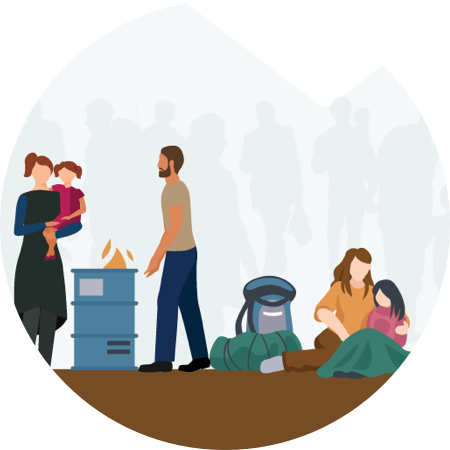Switch Viewpoint:
1


Flee Danger
There are many drivers of forced displacement, including war, conflict, persecution, and natural disaster. As a rights-based actor, RSN is concerned with all forced migrants, with the understanding that different circumstances may lead to different entitlements under international and national law.

Click here to know more about this stage

You should pass by
to unlock the stage
As refugees flee for safety, many leave their possessions, loved ones and previous lives behind forever.
RSN closely monitors forced displacement situations around the world. When such situations arise, RSN maps actors within national civil society of host countries to understand what institutions and service-providers already exist. This helps RSN identify partners and begin to formulate relationships, as well as gain an understanding for the needs and opportunities to contribute in an impactful way.
Close
2


Seek Safety
Having fled danger, refugees prioritize their families’ physical safety, often confronting strict border controls and enforcement mechanisms to access the safety of another country’s territory. Newly arriving refugees are often met with basic humanitarian assistance from their host community.

Click here to know more about this stage

You should pass by
Flee Dangerto unlock the stage
Having fled war or persecution, refugees first focus on their and their family’s immediate needs such as a safe place for them to reside. Very often, refugees confront language barriers in their new host country, and lack awareness of where they can receive assistance. Refugees start to learn about programs run by governmental and non-governmental actors in their new home, but face great difficulties in understanding, let alone navigating, complex bureaucracies for matters such as registration.
Witnessing the plight of newcomers, the host community responds in whatever way they can, offering charity and assistance in informal and formal capacities. Some segments of host communities fear the new arrivals and worry about the effect such newcomers will have. Local civil society mobilizes in response, but resources are hard to come by on short notice. International assistance starts to arrive, but there is almost always a lack of coordination.
RSN believes that a response to forced displacement must involve a rights-based approach that engages the local advocates within the host community. As a US-based actor, RSN seeks to work alongside the important efforts of international organizations and agencies providing aid by formulating partnerships with local advocates who are often overlooked by the traditional response mechanism. RSN participates in forums and conversations with international stakeholders and donors to promote rights-based projects that engage national advocates. In this way, RSN thinks about long-term implications and needs of refugees and capacity development for national host community organizations and institutions. RSN works to ensure timely and systematic support of refugees that is tailored to the local context.
Close
3


Seek Access
After finding physical safety, refugees quickly seek to restart their lives. But rebuilding a life in a new country is beyond difficult. National advocates can help refugees gain access to their rights.

Click here to know more about this stage

You should pass by
Seek Safetyto unlock the stage
At this stage, refugees confront difficulties in being able to enroll children in school, receive medical treatment, and are often only able to access informal work. Refugees are resilient and find innovative ways to carry-on, but they remain in a limbo when reliant on aid.
Civil society often pays witness to the fatigue that sets in on host communities. Individual acts of kindness continue, but refugees are often enmeshed in politics and scapegoated for societal challenges. National civil society knows what actions must be taken to combat xenophobia, recognizing the need for systemic, rights-based response.
For countries without a national asylum structure, RSN works to help clarify what laws apply to refugees and advocates for a sound, rights-based framework founded on human rights principles. One example of such work is an ongoing research and advocacy project focused on identifying what policy applies to the Rohingya community in Bangladesh.
In nations where an asylum system does exist, RSN works to ensure policies and practices are fairly and fully implemented in accordance with the rule of law. We do so by supporting the delivery of legal assistance and counseling and expanding legal information. In Turkey, RSN has worked with national partner RRT since 2015, collaborating to provide legal information and counseling for refugees. RSN and RRT work together to deliver group counseling information sessions for refugees, and jointly developed an online information portal designed to provide accurate, reliable information for refugees on a range of topics. https://refugeerights.info
Close
4


Restore Rights
When refugees have a legal status that allows for access to basic rights and services and they are aware of their rights and how to navigate procedures, they become active, self-sufficient members of their new host communities.

Click here to know more about this stage

You should pass by
Seek Accessto unlock the stage
By securing legal status and knowing their rights in their new country, refugees become self-sufficient. Refugees find the confidence and ability to be contributing members of their new communities.
Development of civil society and institutional capacity helps ensure adherence to the rule of law in the host country more broadly. Independent civil society actors add to the diversity of perspectives within host communities. Legal status and knowledge of rights also plays an important role in other civil society efforts such as those aimed at social cohesion and integration.
Structural support for national institutions requires ongoing engagement. In Turkey, RSN and partner RRT collaborate to provide reference materials for lawyers on international and domestic refugee law.We engage in research and advocacy to support state-funded legal aid and support for bar associations. RSN promotes pro bono partnerships between private lawyers and law firms and NGOs in host countries, modeled after a well-established pro bono system in the US. And RSN continues to engage in advocacy at the global level to influence how the international community continues to approach refugee response. Such efforts contribute to reinforcing the resilience of refugees and host communities.
Close
















